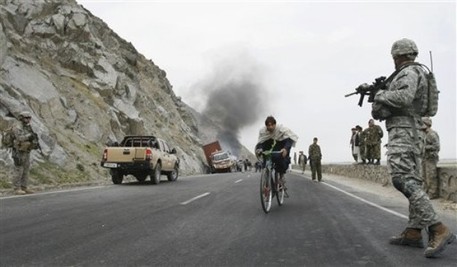Why Afghanistan?

My thoughts in today's NY Daily News on the Afghan debate:
But to escalate the war at the consult of generals and advisers cuts a vital participant out of this critical decision in American history: the American people. And while the current health care debate warranted district-by-district town hall debates and presidential stump speeches, this equally crucial decision has been mostly reserved for the administration and its detractors.We can expect little more from Congress. In a recent interview with CNN, Sen. John Kerry (D-Mass.) - fresh off a diplomatic intervention in Afghanistan - echoed the President's concerns over an excessive troop commitment in the region. Kerry was quick, however, to include the essential asterisk of any American official bound by the long war. "Obviously," remarked Kerry, "if you exhibit weakness or indecision, or if the United States were to suddenly pull out of here, it would be disastrous in terms of the message that it sends. Nobody is talking about that. That's not what's on the table here."
But whether or not such an amorphous "message" - coupled with an equally vague global audience - would be misinterpreted is debatable. Weakness, after all, is relative. But in American civic culture, among the pundit class at least, no such nuance exists.
This leaves the solitary executive to set the agenda and "lead," thus exposing a contradiction in the modern American presidency: Surrounded by a small army of experts and advisers, and deemed "too important for politics," American foreign policy - unlike its domestic counterpart - is ultimately thrust upon one man.
Cornered into acting, these men have often confused convulsive action for progress. The two are deathly dissimilar.
President Obama will likely announce his intentions later this week to send more U.S. forces to Afghanistan. The number being bandied about is 30,000. His supporters will praise the move, while his critics will probably condemn anything short of 40,000. And with that, we have the apparent margin for debate on American involvement in Afghanistan: 40,000 will lead to certain victory, while anything less equals capitulation and appeasement.
The "liberty of the world," after all, is at stake in Afghanistan. But how supporting Afghan "liberty"--or, more precisely, an undemocratic and corrupt regime in Kabul--is somehow in logical sequence with the greater War on Terrorism eludes me.
Why, for example, are we not debating a greater presence in southern Yemen, where al-Qaeda remains active and deadly? Moreover, if a reserved and withdrawn tactic is acceptable in Yemen, why is this not the case in Afghanistan?
At what point do we join alongside the Pakistani army in its mission to clean out South Waziristan? When will we take Iranian concerns of al-Qaeda activity in Baluchestan seriously?
If America is at war then it seems about time that Americans decide the context and the future of that war. Why Afghanistan--which for eight years had warranted little attention or time from Washington until now--is suddenly a vital front in the fight against Islamic extremism is a question in need of an answer.
(AP Photos)



